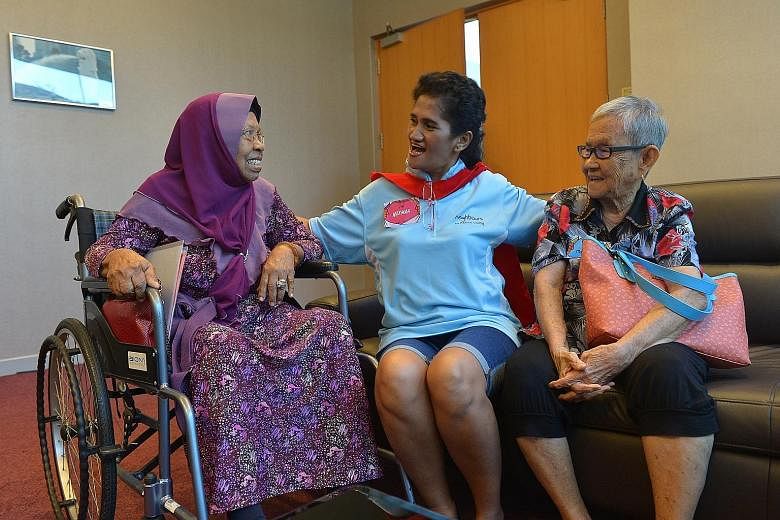Ms Nekmah Mahadi works at a primary school canteen stall from mornings to afternoons.
The 52-year-old, a grandmother, also does the chores at home.
But these have not stopped her from taking on another role: being the "guardian angel" of five vulnerable neighbours aged 64 to 88 in her Bedok South HDB block.
She visits them a few times every week to make sure they take their medication and remember to go for their medical appointments.
Ms Nekmah, who has been keeping an eye on them since 2014, said: "As they grow old, a lot of them have health problems and need more care... I feel happy if I see them happy."
She is one of the more than 200 volunteers who have been trained to help out in the Neighbours for Active Living programme.
Launched in the eastern part of Singapore in 2013 by the Eastern Health Alliance and South East Community Development Council (CDC), the programme trains volunteers to care for vulnerable or elderly residents. These include those who are often admitted to hospital, live alone or have chronic diseases.
So far, 3,010 residents have benefited from the scheme, which is being expanded to the central region, starting with MacPherson and Braddell Heights constituencies.
Last year, about two out of three of the residents had fewer hospital stays within six months of joining the programme.
Senior Minister of State (Defence and Foreign Affairs) Mohamad Maliki Osman announced the programme's expansion yesterday.
Dr Maliki, an MP for East Coast GRC and Mayor of the South East District, was at a volunteers appreciation event at Institute of Technical Education (ITE) College East, where Emeritus Senior Minister Goh Chok Tong presented awards to 45 dedicated volunteers.
Meanwhile, the National Healthcare Group (NHG) will be partnering the Eastern Health Alliance and South East CDC to expand the programme to the central region.
"Volunteers will act as social integrators, helping frail elderly residents navigate and access the needed social support, as well as reinforce basic medical advice," said Professor Philip Choo, group chief executive officer of NHG.
"The aim is to slow disease progression by addressing social factors that may contribute to poor health management."
The number of seniors living alone is expected to increase from 35,000 in 2012 to 83,000 by 2030.
Widow Zainab Abdullah, 73, who has diabetes and conditions like high blood pressure, lives alone. Her four children live elsewhere.
Before she got to know Ms Nekmah, it was hard for her to manage her medication. Of their relationship, she said with a laugh: "It's like a mother-daughter relationship - she's like my mother. Every time, she comes to check on me."


